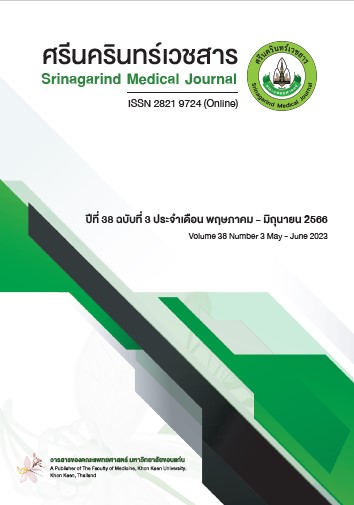Mindset of the First-Year Medical Students, Naresuan University
Keywords:
Mindset, medical studentsAbstract
Background and Objectives: Mindsets are people's beliefs about their own basic characteristics. Each person's mindset affects how they think, feel, and act. People with a growth mindset, when encountering obstacles, they will not give up. As opposed to people with a fixed mind set, when encountering hardships, they retreat. There are many factors in the life of studying medicine that can put pressure on students to develop mental health problems which affect their learning and work performance. Although mindset is an important factor affecting ability to face obstacles during education, data on medical students' mindset has not been studied before. Therefore researchers wanted to study mindset of the first year medical students at Naresuan University to provide basic information for designing an appropriate educational model for students.
Method: A cross-sectional descriptive study with a mindset assessment questionnaire measure the mindset of first-year medical students, Naresuan University. Collecting data from 175 first-year medical students, Faculty of Medicine, Naresuan University. Data was analyzed using frequency, percentage, mean, standard deviation, and One-way ANOVA.
Results: There were 164 first-year medical students, Faculty of Medicine. Naresuan University, participated in the study. Everyone possesses a combination of fixed and growth mindsets. In each topic, students with a growth mindset are more numerous than those with a fixed mindset, except for the topic of change in the fundamental aspect of one’s identity, where students with a fixed mindset are more prevalent. Students of varying ages, genders, hometowns, admission programs, cumulative high school grade point averages, parental occupations, and types of high schools they graduated from do not show a statistically significant difference (p < 0.05) in their average scores of mindset.
Conclusion: First-year medical students of Naresuan University exhibit mixed mindsets, which indicates that they still have fixed mindsets. This information can be utilized by the faculty to tailor their educational approach towards fostering a growth mindset among medical students.
References
Dweck CS. Mindset: the new psychology of success. New York, NY: Random house; 2006.
Dweck CS, Chiu CY, Hong YY. Implicit theories and their role in judgments and reactions: a word from two perspectives. Psychological Inquiry 1995;6(4):267-85. doi.org/10.1207/s15327965pli0604_1
Richardson D, Kinnear B, Hauer KE, Turner TL, Warm EJ, Hall AK, et al. Growth mindset in competency-based medical education. Med Teach 2021;43(7):751-7. doi.org/10.1080/0142159X.2021.1928036
Sakunpong N. Mental health and adjustment problems of medical students in Naresuan University. J Psychiatr Assoc Thai 2008;53(4):369-76.
Rayakew R, Satayasai W. 4-6th year medical students’ stress: Case study at medical center, Buddhachinaraj Hospital, Phitsanulok. Thammasat Med J 2012; 13:17-23.
Rotenstein LS, Ramos MA, Torre M, Segal JB, Peluso MJ, Guille C, et al. Prevalence of depression, depressive symptoms, and suicidal ideation among medical students: a systematic review and meta-analysis. JAMA 2016;316(21):2214-36. doi.org/10.1001/jama.2016.17324
Silpakit C, Silpakit O, Chomchuen R. The validity study of the mindset assessment scale. Mental Health Thai 2015;23(3):166-74.
Dweck CS. What having a “growth mindset” actually means. Harv Bus Rev 2016;13:213-26.
Dweck CS. Self-Theories: Their role in motivation, personality, and development. Psychology Press; 2000.
Pitanupong J, Sathaporn K. The Prevalence and factors associated with mistreatment perception among Thai Medical Students in a Southern Medical School. Siriraj Med J 2019;71(4):310-7. doi.org/10.33192/Smj.2019.47
Ramani S, Könings KD, Ginsburg S, van der Vleuten CPM. Twelve tips to promote a feedback culture with a growth mind-set: swinging the feedback pendulum from recipes to relationships. Med Teach 2019;41(6):625-31. doi.org/10.1080/0142159X.2018.1432850
Klein J, Delany C, Fischer MD, Smallwood D, Trumble S. A growth mindset approach to preparing trainees for medical error. BMJ Qual Saf 2017;26(9):771-4. doi.org/10.1136/bmjqs-2016-006416
Downloads
Published
How to Cite
Issue
Section
License
Copyright (c) 2023 Srinagarind Medical Journal

This work is licensed under a Creative Commons Attribution-NonCommercial-NoDerivatives 4.0 International License.




